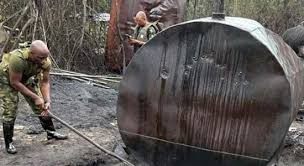The Nigerian Army has destroyed 14 illegal refining sites and confiscated over 350,000 litres of stolen petroleum products during a joint security operation carried out across the Niger Delta region. The operation, conducted in partnership with other security agencies, lasted from July 14 to July 20, 2025, and covered parts of Rivers, Bayelsa, Delta, and Akwa Ibom states.
The Acting Deputy Director of Army Public Relations, Lieutenant Colonel Jonah Danjuma of the 6 Division, disclosed the outcome of the operation in a statement reported by the News Agency of Nigeria (NAN). According to the statement, the security forces arrested 62 suspects in connection with oil theft, pipeline vandalism, and other related economic crimes that have persistently plagued the Niger Delta.
Lt.-Col. Danjuma stated that the army and its partners remain committed to disrupting the illegal bunkering supply chains and dismantling the infrastructure that supports these activities. He noted that six illegal refining sites were discovered and deactivated near an abandoned wellhead in Joinkrama 4, Ahoada West Local Government Area (LGA) of Rivers State.
At the Joinkrama site, security personnel recovered significant equipment used in the illegal refining process. These included six large ovens, several reservoirs, and receivers containing approximately 300,000 litres of stolen crude oil and about 21,000 litres of illegally processed Automotive Gas Oil (AGO). Additionally, a generator, a welding machine, and numerous shovels used for the operations were also confiscated by the troops.
The operation extended to Ikwerre LGA, still in Rivers State, where troops intercepted a Sienna vehicle without a registration number in Elele Town. The vehicle was loaded with 32 sacks containing more than 1,920 litres of stolen AGO.
In Bayelsa State, troops continued their offensive against oil theft by deactivating four illegal refining sites and four dug-out pits located around Biseni in Yenagoa LGA. During this phase of the operation, over 10,000 litres of stolen AGO were destroyed, along with five cooking ovens used in the refining process.
Delta State was not left out of the crackdown. Acting on intelligence, troops arrested two suspects at Gana Road in Sapele LGA. The suspects were caught with two boats filled with 30 cellophane bags containing over 1,500 litres of illegally refined AGO.
Lt.-Col. Danjuma further stated that in Akwa Ibom State, troops have maintained a strong presence to suppress oil theft networks and limit the operational capacity of criminal groups in the area.
This military action follows previous efforts by the Nigerian Army to curb oil theft in the Niger Delta. In June 2025, troops under Operation Delta Safe reportedly deactivated 21 illegal refineries within one week and arrested 23 suspected oil thieves, according to a report by Nairametrics.
Oil theft and illegal refining remain significant challenges to Nigeria’s economy. The continued activities of oil thieves not only cause environmental degradation and infrastructural damage but also deprive the country of much-needed oil revenues. These losses have posed a serious threat to Nigeria’s oil production targets and overall economic stability.
The current federal administration has placed a priority on boosting the country’s crude oil production to over 2.5 million barrels per day. Achieving this target is crucial for increasing foreign exchange earnings, stabilizing the naira, and improving national revenue. The government has emphasized that curbing oil theft is central to reaching these production levels and ensuring that Nigeria fully benefits from its natural resources.
Security experts and stakeholders have often called for sustained collaboration between the military, the Nigerian National Petroleum Company Limited (NNPCL), the Nigerian Navy, and other relevant agencies to address the complex network of oil thieves and their financiers.
Despite continuous military operations, experts warn that long-term solutions require community engagement, economic empowerment, and policy reforms to provide alternative livelihoods for residents of oil-producing communities. Many locals turn to illegal refining and oil theft due to poverty and unemployment, fueling a cycle of environmental damage and insecurity in the Niger Delta.
The Nigerian Army has reassured the public of its commitment to maintaining peace and security in the region, while also protecting the country’s economic assets from sabotage and criminal exploitation.
